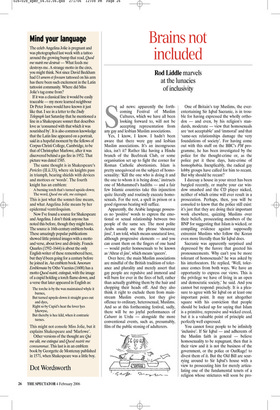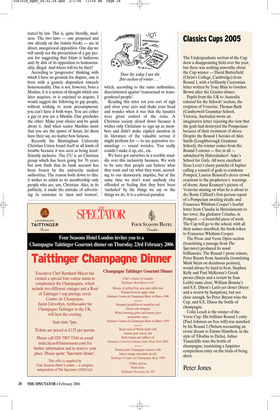Brains not included
Rod Liddle marvels at the lunacies of inclusivity Sad news: apparently the forthcoming Festival of Muslim Cultures, which we have all been looking forward to, will not be accepting representation from any gay and lesbian Muslim associations.
Yes, I know, I know. I hadn’t been aware that there were gay and lesbian Muslim associations. It’s an incongruous idea, isn’t it? Rather like having a Hindu branch of the Beefsteak Club, or some organisation set up to fight the corner for Roman Catholic abortionists. Islam is pretty unequivocal on the subject of homosexuality: ‘Kill the one who is doing it and the one to whom it is being done,’ instructs one of Mohammed’s hadiths — and a fair few Islamic countries take this injunction quite literally and routinely execute homosexuals. For the rest, a spell in prison or a good rigorous beating will suffice.
Apparently, the Arabic language possesses no ‘positive’ words to express the emotional or sexual relationship between two people of the same sex. The most polite Arabs usually use the phrase ‘shouzouz jinsi’, I am told, which means unnatural love, although progressive elements — and you can count them on the fingers of one hand — would prefer homosexuals to be known as ‘Ahrar el jins’, which means ‘queers’.
Over here, the main Muslim associations are mindful of the British tradition of tolerance and plurality and merely assert that gay people are repulsive and immoral and will burn for ever in the fires of hell, rather than actually grabbing them by the hair and chopping their heads off. And they also think it right to exclude them from mainstream Muslim events, lest they give offence to ordinary, heterosexual, Muslims. And so at this forthcoming festival, sadly, there will be no joyful performances of Cabaret in Urdu — alongside the more conventional events, such as, presumably, film of the public stoning of adulterers. One of Britain’s top Muslims, the everentertaining Sir Iqbal Sacranie, is in trouble for having expressed the wholly orthodox — and even, by his religion’s standards, moderate — view that homosexuals are ‘not acceptable’ and ‘immoral’ and that ‘same-sex relationships damage the very foundations of society’. For having come out with this stuff on the BBC’s PM programme, he has been investigated by the police for the thought-crime or, as the police put it these days, hate-crime of homophobia. Inexplicably, the radical gay lobby groups have called for him to recant. But why should he recant?
I daresay a house in your street has been burgled recently, or maybe your car window smashed and the CD player nicked, neither of which crime will ever result in a prosecution. Perhaps, then, you will be consoled to know that the police still exist: it’s just that they are doing their important work elsewhere, quizzing Muslims over their beliefs, prosecuting members of the BNP for suggesting that Islam is wicked, or compiling evidence against supposedly extremist Muslims who follow the Koran even more literally than Sir Iqbal does.
Sacranie was apparently surprised and depressed by the furore that greeted his pronouncements. Why can’t you be more tolerant of homosexuals? he was asked by his interlocutors. He replied, ‘Well, tolerance comes from both ways. We have an opportunity to express our views. This is the privilege we have of living in an open and democratic society,’ he said. And you cannot but respond: precisely. It is a pleasure to agree with Sir Iqbal on at least one important point. It may not altogether square with his conviction that people should be locked up for saying that Islam is a primitive, repressive and wicked creed, but it is a valuable point of principle and perfectly well expressed.
You cannot force people to be infinitely ‘inclusive’. If Sir Iqbal — and adherents of the Muslim faith in general — believe homosexuality to be repugnant, then that is their view and it is not the business of the government, or the police or OutRage! to divest them of it. But the Old Bill are scurrying around to Sir Iqbal’s house with a view to prosecuting him for merely articulating one of the fundamental tenets of a religion whose strictures will soon be pro tected by law. This is, quite literally, madness. The two laws — one proposed and one already on the statute books — are in direct, unequivocal opposition. One day we will surely see the prosecution of a gay person for suggesting that Islam is ludicrous and, by dint of its opposition to homosexuality, illegal. And where will we be then?
According to ‘progressive’ thinking, with which I have no grounds for dispute, one is born with a genetic disposition towards homosexuality. One is not, however, born a Muslim; it is a system of thought which one later acquires, or is enjoined to acquire. I would suggest the following to gay people, without wishing to seem presumptuous: you can’t have it both ways. You are either a gay or you are a Muslim. One precludes the other. Make your choice and be quick about it. And when senior Muslims insist that you are the spawn of Satan, let them have their say, no matter how fatuous.
Recently the Birmingham University Christian Union found itself in all kinds of trouble because it was seen as being insufficiently inclusive. The CU is an Christian group which has been going for 76 years but now finds that its bank account has been frozen by the university student authorities. The reason boils down to this: it wishes to admit to its membership only people who are, um, Christian. Also, in its publicity, it made the mistake of advertising its existence to ‘men and women’, which, according to the same authorities, discriminated against ‘transsexual or transgendered people’.
Reading this utter rot you sort of sigh and close your eyes and shake your head and wonder when it was that the lunatics were given control of the reins. A Christian society closed down because it wishes only Christians to sign up as members and didn’t make explicit mention in its literature of the valuable service it might perform for — to use pejorative terminology — sexual weirdos. You really couldn’t make it up, etc., etc.
We have got ourselves in a terrible muddle over this inclusivity business. We wish to be sure that people can believe what they want and say what they want, according to our democratic impulse, but at the same time we don’t want anybody else offended or feeling that they have been ‘excluded’ by the things we say or the things we do. It is a colossal paradox.






























































































































 Previous page
Previous page